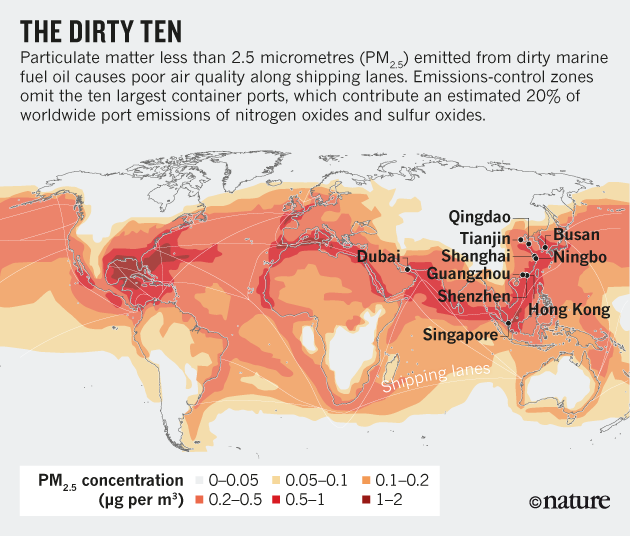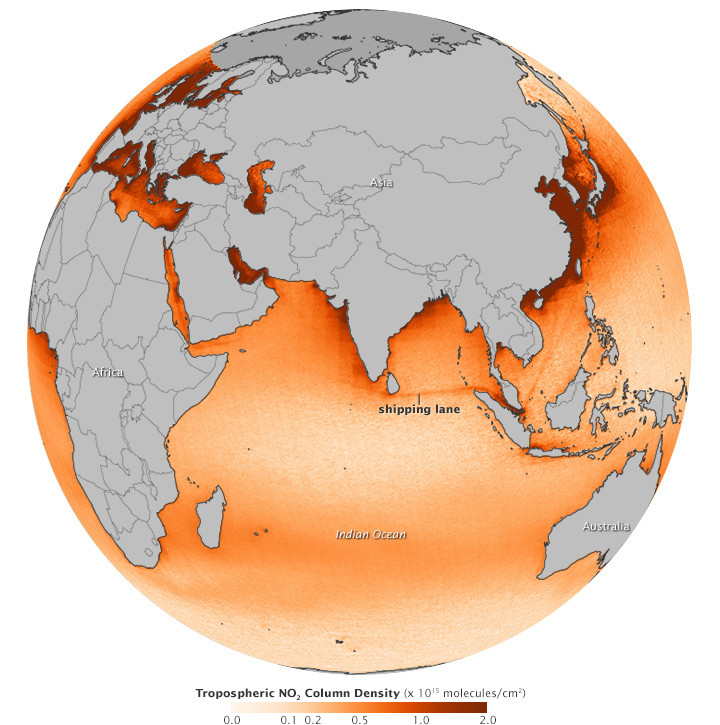Greener ships for a sustainable future (IMO)
Shipping contributed about 3.1% of total annual carbon dioxide, or CO2, emissions in the period from 2007 to 2012, according to an International Maritime Organization study
Shipping contributed about 3.1% of total annual carbon dioxide, or CO2, emissions in the period from 2007 to 2012, according to an International Maritime Organization study
From Greenpeace by Veronica Frank
It’s essential for transporting goods across the world, but the shipping industry has so far escaped strict regulations to clean up its climate-polluting emissions due to aggressive industry lobbying and a lack of public scrutiny.
You can now help change this.
After years of inaction, the International Maritime Organization (IMO), the UN body responsible for global shipping regulations, will meet in London on April 9 – 13 to finally agree on a plan to tackle the carbon emissions from ships.
While there are many things we can do to lower our own emissions – from cycling to saying no to single-use plastic or eating less meat – some things are further out of our hands, such as shipping.
But together we can give the IMO a massive wake-up call for the sake of the planet.
Nature and Biodiversity Conservation Union (NABU), a Germany-based environment association, has launched a campaign for a cleaner cruise industry.
Cutting emissions from shipping would play a key role in meeting the Paris Climate Agreement’s goals and here are five reasons why we need to put the spotlight on the IMO.
Shipping is a major contributor to climate change
Ships carry over 80% of world trade, using vessels that operate on marine fuels which are cheaper but dirtier than road transport diesel fuels.
source : American Chemical Society 2007
The sector’s emissions have been growing three times faster than global emissions and if left unchecked emissions could grow by 50-250% by 2050.
Aggressive lobbying and lack of public scrutiny has led to lack of action
The IMO is heavily influenced by the shipping industry, which has prevented the adoption of ambitious climate rules for the sector.
The lack of public scrutiny on the IMO – unlike other UN organisations – has helped the industry avoid emissions regulations.
The IMO’s transparency has been reviewed by anti-corruption organisation Transparency International, which found that weak IMO governance is delaying action on climate change.
The IMO’s April meeting can be the first step towards greener seas
At its meeting in London, we must ensure the IMO agrees on a high ambition plan to reduce shipping’s climate impact before a final deal is agreed in 2023.
Greenpeace is working with a coalition of NGOs to increase the sector’s climate ambition.
We urge the shipping industry to phase out emissions by 2050 at the latest and the faster the better.
No time to waste for low ambition
IMO membership is split between countries wanting to take climate action (such as the climate vulnerable Pacific island states and most of the EU states), those who want to lower ambition, like Japan, and those who are resisting any action, such as Brazil, India, Saudi Arabia and Argentina.
But climate impacts respect no boundaries and we’re already experiencing more extreme floods, droughts, hurricanes and heatwaves and the IMO needs to hear from you about the urgency of action!
A Satellite’s View of Ship Pollution
OMI is not the only satellite instrument observing NO2 levels in the atmosphere.
The solutions are available.
We need industry-wide adoption
If ships are required to operate at lower speeds this could reduce emissions by a third and save fuel. Using carbon-free fuels and propulsion technologies, like wind-assisted propulsion, or battery-powered engines can also cut emissions and significantly reduce costs.
Greenpeace is already doing its small bit.
Our flagship the Rainbow Warrior is propelled by a two-mast structure with 1,255 m2 of sailing rig, large enough for a work vessel that also has a helideck.
We invested in the latest clean technology TIER 2 engines when it was built in 2010.
Imagine if, instead of using the cheapest and dirtiest fuel (so-called Heavy Fuel Oil) that poses serious health risks and could cause catastrophic damage in the Arctic, a worldwide ban was introduced on its use and transport through the Arctic, and the best in clean technology deployed across the entire shipping industry.
What can you do to help?
You can add your voice to those calling for a cleaner shipping industry by sharing the Cleaner Ships for a Safer World Facebook page here.
Links :
- Bloomberg : Shipping Is Part of the Climate Problem
- WSJ : Maritime Regulator Seeks to Overcome Deep Divisions on Shipping Emissions
- NY Times : Polluters on the High Seas
- BBC : Shipping faces demands to cut CO2
- Inside Climate news : Shipping’s Thick Fuel Oil Puts the Arctic at Risk. Could It Be Banned?
- TradeWinds : Shipping industry faces moment of truth on climate change stance
- ShipInsight : Future technologies on ships that are approaching maturity
- Deutsche Welle : Are electric vessels the wave of the future in shipping?
- Nature : Pollution: Three steps to a green shipping industry
- The Guardian : Health risks of shipping pollution have been 'underestimated'
- New Scientist : Shipping pollution kills 60,000 every year
- GeoGarage blog : Image of the week : signs of ships in the clouds / Ship exhaust makes oceanic thunderstorms more ... / Lower emissions on the high seas / Warns of the effects of shipping emission policy on ... / Bringing the electric revolution to the seas / Maersk claims new 'mega containers' could cut shipping emissions



Climate Home : Shipping to halve carbon footprint by 2050 under first sector-wide climate strategy
ReplyDeleteThe Guardian : Carbon dioxide from ships at sea to be regulated for first time
ReplyDelete